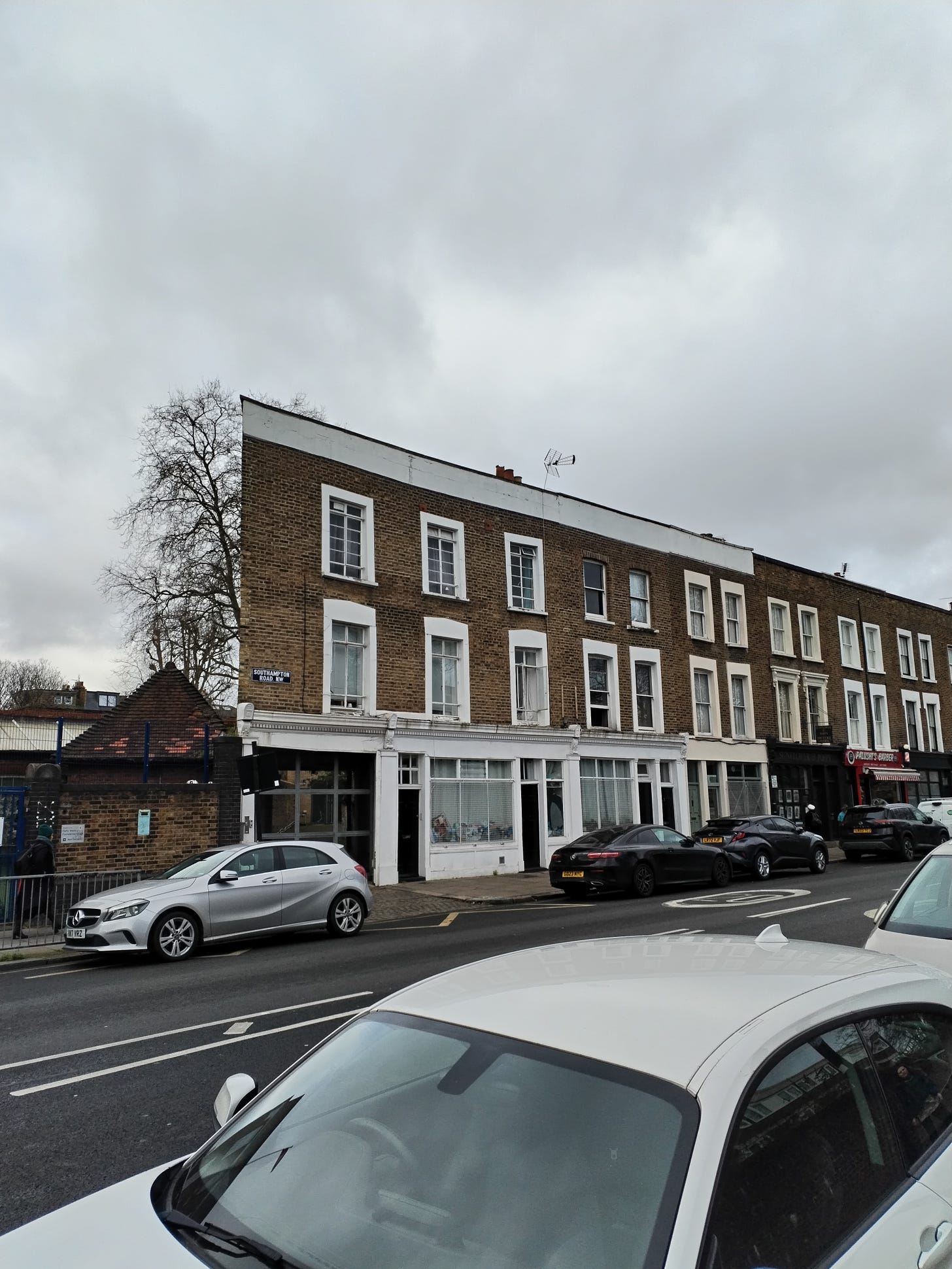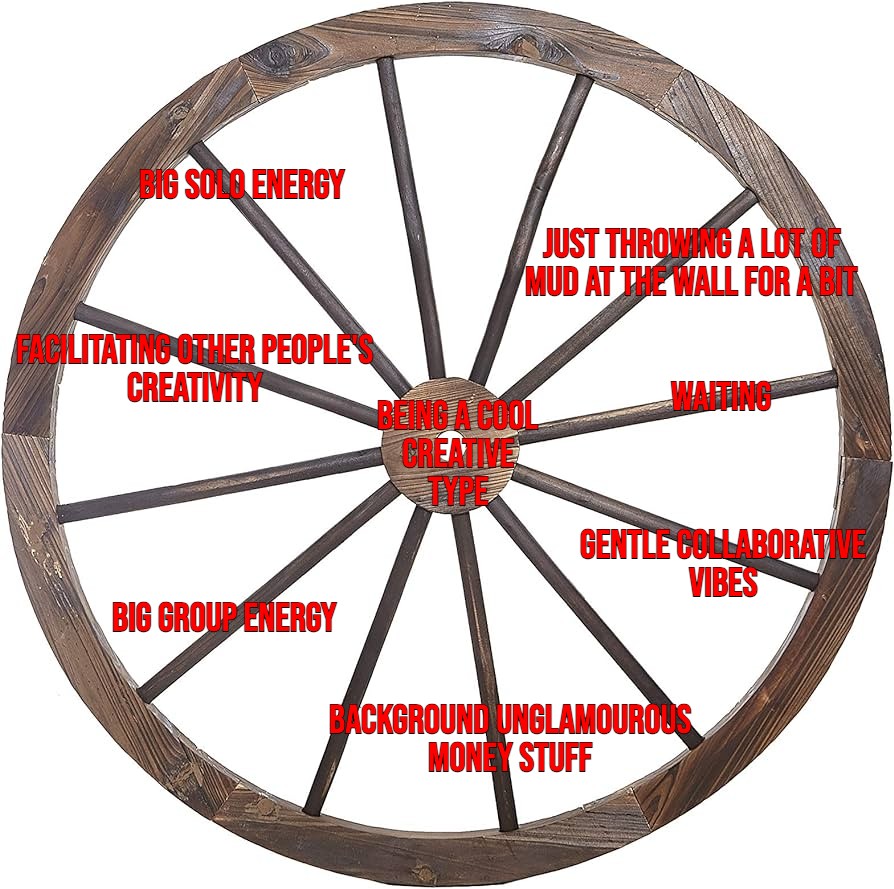Tape 130: Wheels Not Ladders
Hello! Hope you’re all doing well. Apologies that it’s been a few weeks since the last Therapy Tape – January was a busy month of getting the ball rolling on various projects for the year, and I’m only now clawing back the time to sit and write about what I’ve been thinking about! First up, let me whip through the “Newsletter Promo Admin” stuff, because I prefer to get that stuff out of the way:
First up, in a couple of weeks I’ll be releasing the full recording of my Comedians’ Choice Award-winning 2019 show Joz Norris Is Dead. Long Live Mr Fruit Salad, filmed by the good folks at Go Faster Stripe, on YouTube as a comedy special. I loved revisiting this show a few years down the line from its initial success, and we’ve got a couple of fun treats in store for the big release. For now, here’s a trailer, and if you saw this show back in the day and enjoyed it then I’d love you to give it a share and let people know it’s on its way!
And secondly, I’m in the early stages of figuring out a brand new show, which is the first new idea which I can actually see in my head as a show rather than as a collection of random stuff I’ve written, so that feels a nice thing to be exploring. For now, it’s just booked in for a couple of work-in-progress outings in Leicester and Machynlleth in February and May, but if you’re planning on going to either of those comedy festivals, I’d love to see you there! After that I’ll try to book it in for another WIP in London somewhere, then there’s vague talk of it going to Berlin and (whisper it…) Edinburgh in July and August. We will see!
Three Models for the Creative Life
Anyway, onto this week’s big musings. Recently I was talking to some fellow writer-performers/comedians/artists who’ve been in this game for as long as me, and we landed on an interesting dilemma around how the world perceives and understands a creative career, and how that’s ended up shifting our own priorities and attitudes towards what it is we do.
Trying to build a career out of comedy, or out of any kind of creative pursuit, is hard and comes hand-in-hand with unpredictability and risk. You might have a big year with lots of successful projects, and you might have a slow year where you try to figure out what’s next. You might make more money than you know what to do with, then next year you might make nothing at all and be hugely reliant on a random windfall – some unexpected casting that comes out of the blue, or whatever it might be.
For a long time, the risk and the wild unpredictability feel like part of the fun. You go with it, because you’re young and you’re basically being paid to be silly and do what you love. These days, I’m finding myself hankering for a bit more stability, because it’s tiring having the bulk of your income founded on factors that are entirely outside of your control. There has to be something you can fall back on that you can control yourself, so that the unexpected wins can happen when they happen and bring in new avenues and new opportunities without your being hungrily reliant on them. Over the last year I’ve moved into creative consultancy on live shows and scripts and am really loving it – it’s been a pleasant surprise to find that it’s something I’m really good at, and I’ve loved helping develop other people’s sitcoms and short films and live shows to be as good as they can be. It’s a nice easy thing I can do in my own time as I slowly build a client base and a portfolio of testimonials for the work I was able to do, so the bigger, more uncontrollable things – castings, options, script commissions – can happen if and when they happen without my sitting around thinking “Come on, I need this,” which is a bad energy to send out into the universe. I’ve loved how much more relaxed it’s made me.
It’s also had the bonus effect of making me feel less like I’m completely focused on myself and my own creativity, and to recognise the ways in which I’m good at helping other people and facilitating their own great work. It’s a nice feeling. Sometimes when all you’re doing is working on your own stuff, even when you’re surrounded by people who are enjoying that stuff, it can feel a bit lonely because it’s hard to tell if what you’re doing is really helping anyone or if you’re just doing it for yourself.
But interestingly, I’ve had some conversations with people about this trend – away from purely self-reflective work, towards some kind of sustainable model where I have more control over the work I do – and noticed interesting reactions. “Yeah, I know what you mean,” people have said, “I’m not that bothered about success any more either.” The weird thing is that I haven’t even mentioned “success” when I talk about this to people. It doesn’t really factor into my decision making. And some people, when you explain this to them, have a very odd reaction. They say things like “Oh, but you shouldn’t give up.”
I think society has bred very unusual attitudes towards the concepts of “success” and “giving up.” It’s created a model where that youthful, hungry energy that compels you to sit with discomfort and risk and wait for big things to happen to you, is the only energy we can recognise as true “creative energy.” Any other models that are less focused on reaching or grasping and more focused on sustainability and comfort and patience are often interpreted as being somehow defeatist, or “anti-success.” I think often when I talk to people about this, the conversation settles down into recognising three basic models, three states, for what a creative life can look like, with the concept of creativity itself being a sort of ladder that moves us from State Three up to State One:
- STATE ONE – “SUCCESS” – You “make it,” you do work in your field that becomes so celebrated and recognised that it pays you a very comfortable wage and you don’t ever have to worry about doing anything else. This comes entangled with the problematic concept of “fame,” about which the less said the better because it’s a whole other topic for another time, and this week’s newsletter is more to do with comfort, really.
- STATE TWO – “STRIVING” – You haven’t “made it” yet, but you’re still trying your best. Whether or not your endeavours to persist with a creative career can ultimately be judged a success or not will depend on whether or not you “make it” or “give up.” This state is a liminal state defined by its desire to move towards State One, and its desire not to slip towards State Three.
- STATE THREE – “GIVING UP” – You make the perfectly reasonable decision that the anxiety and doubt and financial struggle that comes with State Two is not conducive to your emotional wellbeing, and decide to do something that provides you with sustainable comfort. You probably continue with your creative projects and endeavours, but they are now perhaps perceived as being pursued outside of States One and Two, in a way that means you’re no longer interested in “success,” you’re just doing it “for you.”
I think this ladder model is hugely problematic. For a start, a lot of people I know in State One are far less happy than those in State Three. A lot of the people who, in my opinion, are making the best and most interesting work right now are in State Three, because good work comes out of emotional balance and wellbeing, not out of ego (State One) or need (State Two).
But my biggest problem is that we’re socially programmed to consider State Two as being a liminal state somewhere between the vague, nebulous concepts of “making it” and “giving up,” rather than imagining a different model for what a creative life outside of those two states can look like.
Wheels Not Ladders
When people ask me what I want to achieve in comedy, I always say the same thing – I want to keep getting more opportunities to make the kind of work I love making. I don’t care about the medium – I love making live shows, I love making films, I love making radio, I’d love to make stuff for TV, I’d love to get better at making stuff in the podcast space. Whether the things I make become enormous successes or modest little things that a few people really like doesn’t matter much to me, as long as each one nudges me vaguely towards the opportunity to keep doing more of it.
Of course, in this day and age, that’s a big ask. Continuing to create more and more opportunities to make comedy projects is hard, and it does kind of demand that each project is that bit more “successful” than the last, so the people you’re working with have confidence in you. And because of that, it’s easy for people to slip into this three-state model of thinking, and demand that whatever you do be bigger, better, flashier than whatever you did before, so you can keep climbing from State Three to State One. But I just think the whole thing is so unhealthy.
Much as our difficulty getting the general public to show much initiative about the climate crisis comes down to a crisis of imagination, I think the same is true of people’s attitudes to creativity and work. We’ve been told so long that a creative career is a long, slow grind up the ladder from “Day Job” to “Fame” that it can be hard for people to adapt and understand it differently and see it outside of those concepts.
I prefer to think of a creative life as being like a wheel, not a ladder. Creativity itself is at the centre because it’s infinite, it can’t be depleted – you can move around the spokes of the wheel however you want and always be able to return to that centre whenever you want. It will always be there for you, and it will in some way be connected to whatever else you do on that wheel. But you’re free to slide along any one of those spokes at any time, and explore different aspects of your creativity whenever you need to.

Sometimes that might involve going all-in on risk, throwing everything behind a big solo project which you think the world is really going to enjoy, so it’s worth sitting with the discomfort of going all-in on something for a bit. Sometimes it might involve sliding along a more collaborative spoke and aligning your creativity with other people, maybe on a shared project, or maybe just offering your own skills onto somebody else’s project entirely. Sometimes it might involve sliding the dial towards comfort, and just doing something a bit invisible that keeps you collaborating and creating and making, but in a way that prioritises your own sustainability and control – something like my script consultancy, say, or like other people I know who edit on the side, or write content for brands, or whatever it might be. All of them are connected to that central hub, but you get to choose where on the wheel you want to be at any one time, based on what you want your life to feel like this month.
This is too complicated to explain to people at parties, though, so when people I don’t know ask me what I do, I still just say “Oh, I make comedy stuff,” and when they ask me if I’ve done anything they might have seen I still just smile and shake my head and say “Probably not, but irons in fires, things in the pipeline,” or whatever other rubbish people think they want to hear when they ask that question. But one day I hope a better model emerges that means we can look at creative careers as things that are defined solely by their own creativity, not by a linear understanding of “success.” I think it would make life much easier for everyone.
By the by, while I’m here talking about my consultancy work, I’ve just had my latest batch of testimonials for the work I did in January, which included a play, two sitcom scripts and a short film. I’m now booking in more of these projects for February and beyond, and the testimonials are below, so if you’re working on a creative project of your own and need some outside-eye expertise on it, feel free to get in touch! I’d love to hear from you, and will be happy to collaborate on any project I feel I’d be a good fit for.
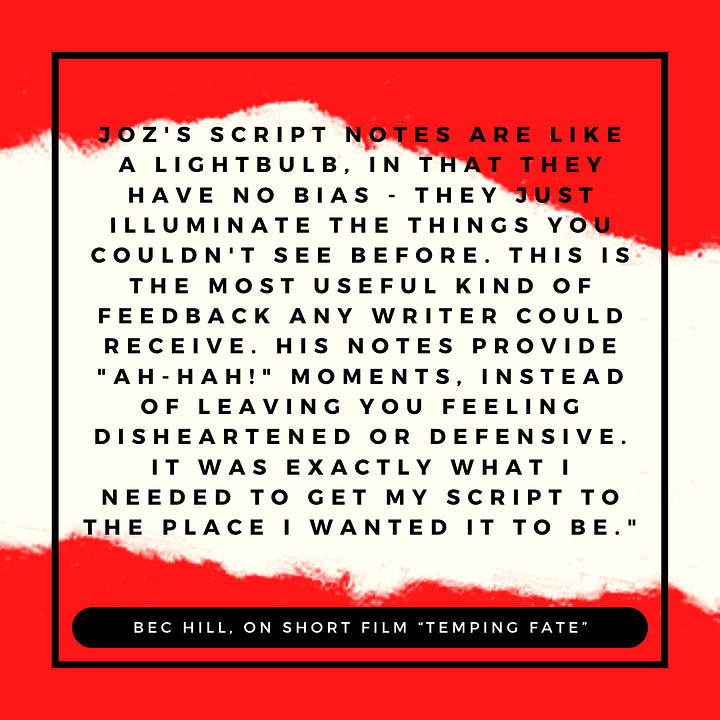
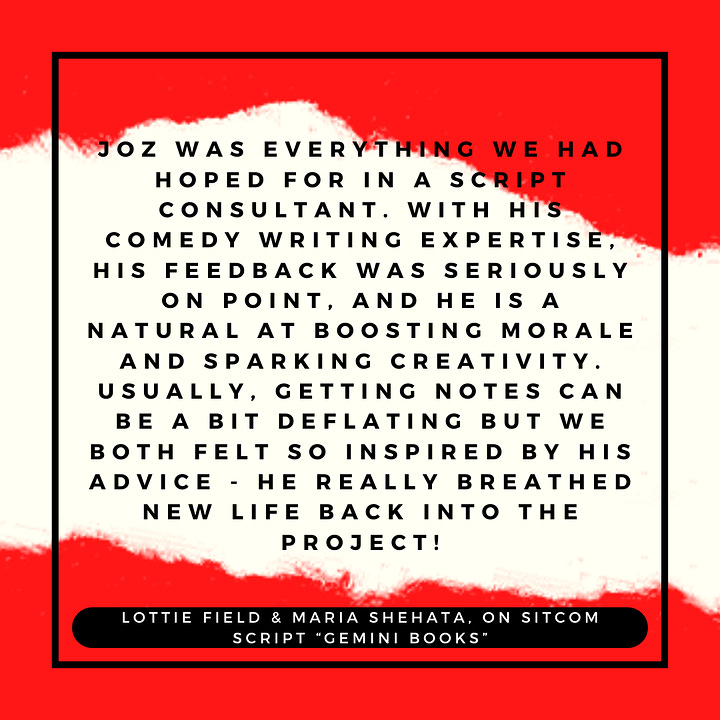

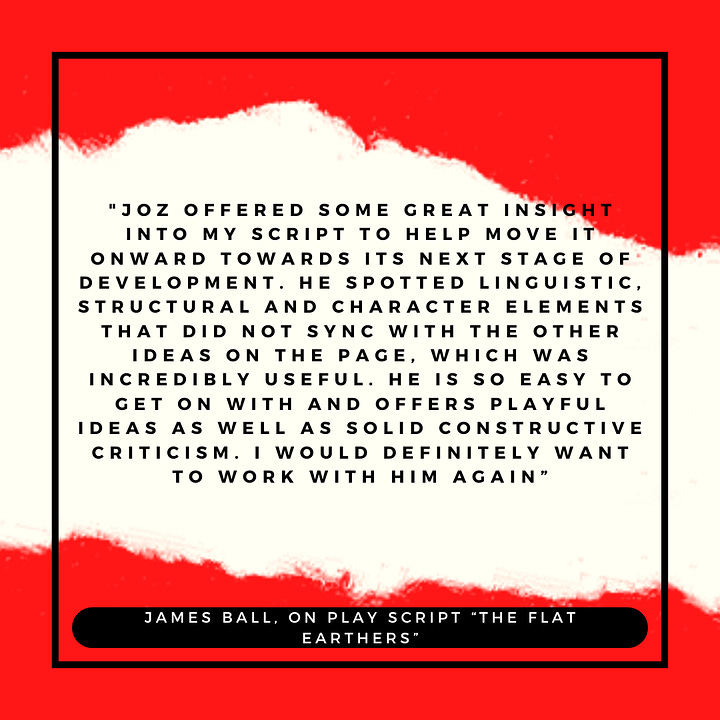
A Cool New Thing In Comedy – The Chortle Award nominations just came out and it’s lovely to see so many friends and cool people up for them – John Kearns, Lorna Rose Treen and Lachlan Werner (annoyingly up for the same award, not sure how to resolve that one), Alexander Bennett & Andy Barr’s Born Yesterday, Julia Masli, Sam Nicoresti, and many more. Hop on over and vote for your favourites!
What’s Made Me Laugh The Most – The scene in American Fiction where Jeffrey Wright decides to give his book an even more stupid title than the one he initially pitched it with. It’s such a funny film.
Book Of The Week – Acting Class by Nick Drnaso. Thanks to Max Brill for lending this to Miranda and me – it’s a really chilling, weird, uncanny, disturbing graphic novel about a group of strangers who join an acting class, and then it just explodes a bunch of ideas about the gap between fantasy and reality. I was hooked.
Album Of The Week – Dragon New Warm Mountain I Believe In You by Big Thief. I’m watching Big Thief support PJ Harvey later this year so I thought I’d get into them, and this album is a masterpiece. How did they make a 90-minute album containing pretty much every different genre that I want to listen to multiple times without skipping anything? It’s incredible.
Film Of The Week – American Fiction. It’s not just very funny, it’s incredibly lovely and clever and smart and beautiful and sad. It’s by far the best of this year’s Best Picture Oscar noms, and I’d love to see it beat Oppenheimer. I imagine it won’t, but do go and see it, it’s brilliant.
That’s all for this week! As ever, if you’ve enjoyed this newsletter and would like to send it to a friend or encourage other people to subscribe, I’d hugely appreciate it! Take care of yourselves until next time,
Joz xx
PS I’m never going to actually charge for this newsletter or put it behind a paywall, but I do write it for free and the comedy and media industries are in a perilous state right now, especially for freelancers. If you value the Therapy Tapes and enjoy what they give to you, and want to support my work and enable me to keep writing and creating, you can make a one-off donation to my Ko-Fi account, and it’s very gratefully appreciated.
PPS For a while now I’ve been collecting photos of buildings that look fake from the right angle. Here’s a recent favourite:
